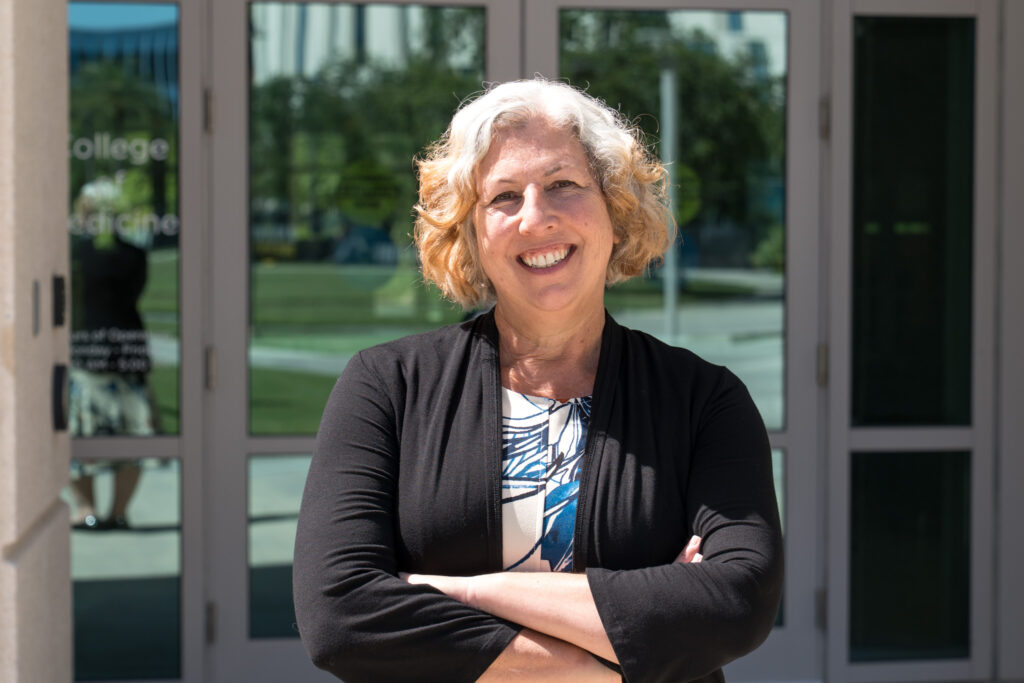
UCF infection preventionist Dr. Cindy Prins has been named a fellow of the Association for Professionals in Infection Control and Epidemiology (APIC) – the highest honor for a scientist focused on better ways to prevent infectious diseases.
APIC is the leading professional association for infection preventionists, with more than 15,000 members. Dr Prins is one of just 39 fellows selected worldwide this year.
“Fellow is a signifier of your commitment, not just to APIC, but to infection prevention as a profession,” said Marie Wilson, a fellow of APIC and infection preventionist at Fred Hutchinson Cancer Center in Seattle who served on the APIC Communications Committee with Dr. Prins. “Infection prevention is a young profession, and every fellow that carries that distinction is a part of getting us to where we are today.”
Dr. Prins began her career as a virologist, before a passion for public health inspired her to transition to epidemiology, studying healthcare-associated infections, and how to prevent them from spreading.
“I was really interested in the transmission and spread of these tiny microbes that can wreak so much havoc on a person, and how we can prevent that,” Dr. Prins said.
Her first role was in hospital infection control at University of Florida Shands Hospital in 2006, before shifting toward education and research as a UF Department of Epidemiology faculty member in 2010. But when the COVID-19 pandemic struck, she was found herself practicing infection prevention again.
“During the pandemic, I was the infection preventionist for the whole campus, which brought me back into that applied infection prevention role that I was doing before, but in a very different setting,” Dr. Prins said. “I think that sparked my interest again in being able to work with people to communicate how to prevent these infections.”
As the pandemic began to subside, Dr. Prins began exploring ways to continue to support infection prevention beyond her local community. She joined the APIC’s Communication Committee, which provides infection prevention information and materials to medical professionals, hospitals and the public.
“Dr. Prins has a depth of knowledge and expertise that I truly valued working with her on the Communications Committee,” said Wilson. “She was very calm, reliable and kind in a way that I really appreciated as a colleague.”
Dr. Prins joined the UCF College of Medicine’s Population Health Sciences Department as an associate professor of medicine in 2023, where she is working to improve infection prevention in nursing homes, both through her own research and mentoring UCF medical students researching infection prevention.
“In nursing homes, you have people who have frequent encounters with hospitals and are very ill and also may have medical devices or non-healing wounds that make them sicker and really susceptible to infection,” she said. To fight this, Dr. Prins is working with a company to test a shoe insert to provide contact tracing in nursing homes. If an infectious disease outbreak begins, nursing home staff attempt to track who has had contact with other people to find who may be infected. But patients with Alzheimer’s disease or dementia may not be able to recall who they have been in contact with or where they have been. This new technology hopes to tackle that.
Dr. Prins also serves as a mentor for the UCF College of Medicine’s Focused Inquiry and Research Experience (FIRE) module, which requires medical students to complete a research project during their first two years of medical school.
This year, Dr. Prins is working with a student who is analyzing the effectiveness of new Centers for Disease Control and Centers for Medicare and Medicaid Services protocols designed to reduce the spread of infectious diseases. These precautions, implemented last year, require nursing home personnel to wear gowns or gloves for high-contact care with patients at a high risk for multidrug-resistant organisms. Together, the student and faculty mentor hope to understand how the protocols are being implemented and if they are improving patient safety.
“When infection prevention is being done well, you don’t see it at all,” Dr. Prins said. “It’s about preventing harm and keeping people safe.”